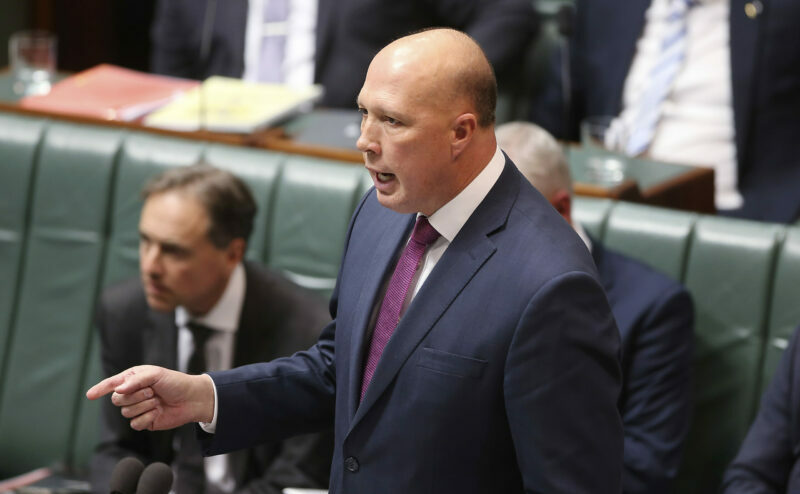Relax Mr Dutton, China is not an invading power (like US and us)
December 2, 2021
The defence minister fails to acknowledge the superpowers efforts to calm tensions, or that the US has jumped in to claim some of our former markets.
Defence Minister Peter Dutton should take time out from playing Winston Churchill and warning the world not to repeat the mistakes of appeasing a powerful country such as Germany in the 1930s. Never mind that there is a huge difference between then and now. The US is far and away the most military powerful country on earth but there are constant alarmist claims about the alleged threat from China.
Despite all his bluster, Dutton recently told the National Press Club in Canberra that in his judgment, China does not wish to occupy other countries. But he warns that China could invade Taiwan at any moment. He told the press club that If Taiwan is taken, surely the Senkakus is next.
There is nothing sure about that. The Senkakus, called the Diaoyu by China, is a group of uninhabited rocky islands located between Japan and China that neither country seems keen to go to war over. Nor is it obvious that China is desperate to invade Taiwan, as explained in the latest Pentagon report to Congress on Chinese military power.
The report says Chinas most prominent conceptual military thinking is about an amphibious invasion of Taiwan. The Pentagon describes an amphibious invasion is one of the most difficult military operations to execute successfully. It says any attempt to invade Taiwan would likely strain Chinas armed forces and invite international intervention. When combined with the attrition of Chinas combat forces and the complexity of urban warfare and counter-insurgency, the report says this makes an amphibious invasion of Taiwan a significant political and military risk for Xi Jinping and the Chinese Communist Party.
Although the report says Chinas forces are capable of invading small Taiwan-occupied islands, it says this kind of operation involves significant and possibly prohibitive political risk because it would galvanise pro-independence sentiment on Taiwan and generate powerful international opposition.
Reassuringly for those who dont look forward to a war, the Pentagon says China has not acquired the large number of specialist transport ships and landing craft for an amphibious invasion suggesting a traditional large-scale direct beach operation requiring extensive lift remains aspirational.
Australias former ambassador to China, Geoff Raby, sees another obstacle to Beijing invading Taiwan, whose population is Han Chinese like most of the mainland. He says if Chinas leaders kill large numbers of Taiwanese they will quickly become very unpopular at home.
Putting Chinas territorial disputes in a context that eludes Dutton, the Pentagon report says that since 1998 China has settled 11 land-based territorial disputes with six of its neighbours, but has been more coercive in recent years in maritime territorial disputes. The report would have been more balanced if it had acknowledged that US military expenditure of about $US800 billion a year is more than the total for the next 11 biggest spending countries, including China.
Australia has no maritime or land territorial disputes with China. But Dutton told the press club that China sees us as a tributary state without providing any evidence of how or why it does. He loosely defines of a tributary state as one requiring the surrender of our sovereignty and the abandonment of any adherence to international law which our country has fought against since Federation. In fact, Australia violated international law when it helped invade Vietnam and Iraq with terrible consequences for the inhabitants. The Vietnamese people won that war and Vietnam is now a one-party communist state, like China, with a bad human rights record. But it now benefits from what Foreign Affairs calls a process of deepening strategic, defence and security co-operation with Australia.
One of the more disturbing aspects of Duttons approach is that he fails to support America and Chinas efforts to calm tensions during the recent virtual summit between presidents Xi and Biden. Biden said he didnt want any change to the status quo in which the US does not support Taiwans independence but would support its defence of the island. Xi said that Chinas policy was still to incorporate Taiwan by peaceful means by 2050 but it would use force if Taiwan declared independence. Taiwans democratically elected leaders prudently refrain making make such a declaration when they already have a form of de-facto independence. The main exception to this form of stability is that it excludes any right for Taiwan to invite the US to establish military bases so close to the Chinese mainland.
The US has invited China to begin much-needed negotiations on nuclear arms control. Although the Pentagon projects Chinas arsenal to grow to around 1000 warheads by 2030, thats only about one-fifth of the quantity held by the US and Russia each. The US warheads have become much more powerful with new fusing technology that make China and Russias land-based missiles more vulnerable to destruction in a first strike.
Progress been made on improving bilateral economic relations, partly achieved by China agreeing to buying more goods from the US that it had previously bought from Australia, such as large quantities of natural gas. Unperturbed about this treatment from an ally, Dutton has agreed to let the US base more troops and weapons in Australia to defend it against a country he says does not want to occupy Australia.

